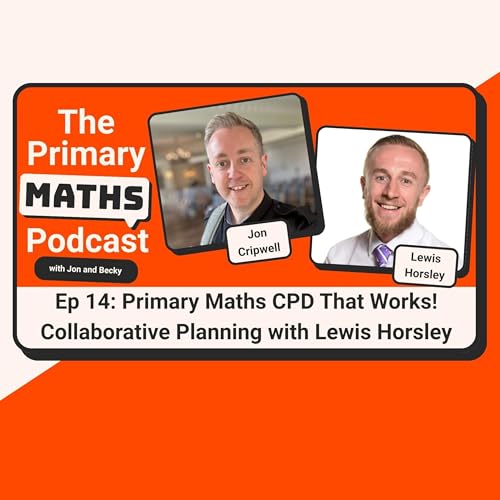
Primary Maths CPD That Works! Collaborative Planning with Lewis Horsley
カートのアイテムが多すぎます
カートに追加できませんでした。
ウィッシュリストに追加できませんでした。
ほしい物リストの削除に失敗しました。
ポッドキャストのフォローに失敗しました
ポッドキャストのフォロー解除に失敗しました
-
ナレーター:
-
著者:
このコンテンツについて
Welcome to Episode 14 of the Primary Maths Podcast. This week we’re joined by Lewis Horsley, who somehow manages to juggle teaching Year 2, leading maths and KS1, sitting on SLT, supporting ITT students, being a Primary Mastery Specialist with the East Midlands West Maths Hub, and facilitating the NPQLPM course… all while also completing his NPQH.
Lewis sat down with us to talk about the joys and challenges of teaching and leading maths in primary school. We cover:
- What makes maths lessons engaging for both pupils and teachers
- Why a noisy classroom can actually be a productive one and how purposeful talk builds mathematical thinking
- How collaborative planning can transform professional development for teachers, and Lewis’ top tips for making a session truly effective
- The importance of doing the maths yourself first and how it helps uncover misconceptions before pupils face them
- The four golden questions Lewis always comes back to when planning lessons (and why they work for every subject, not just maths)
We also get into why pupils need to hear that getting things wrong is not only inevitable but essential, how to avoid staff meetings where everyone is laminating instead of listening, and why “accidental teaching” is sometimes the most powerful kind.
Lewis has started sharing his thinking in a new blog series called Plan Maths, hosted by Derby Research School. You can find the first instalment here: Plan Maths – Derby Research School. Keep an eye out for part two coming soon.
As always, Becky and I unpack the key takeaways in our debrief after the interview. From purposeful talk to remembering the value of doing the maths yourself, there’s plenty here to spark reflection and maybe even change what you do in class tomorrow.
If you enjoy the show, don’t forget to follow or subscribe on your podcast app of choice, and share it with a colleague who loves (or maybe needs to love) maths as much as we do. You can also leave us a rating or a review — it really helps others to find the show.
And finally, we’d love to hear from you. What are your favourite non-standard units of measurement in everyday life? Drop us a message at primarymathspodcast@twinkl.co.uk or in the YouTube comments.
#twinklmaths



